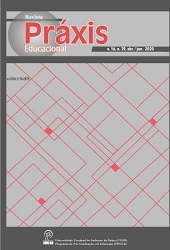AFRICANIDADES AND CULTURAL TRIBALISM: EXPERIENCES OF TEACHERS FROM THE AFRICAN CITY OF OBUASI, GHANA
DOI:
https://doi.org/10.22481/praxisedu.v16i39.6362Keywords:
Cultural tribalism, Africanidades, Teachers experiencesAbstract
This article presents dimensions of a study that focused on the pedagogical experiences of a group of teachers from public schools in Obuasi, Ghana, in West Africa. The objective is to present the specificities of the teachers' experiences, by means of an informative, analytical and reflective approach to the cultural tribal relations in the school arena, the valorization of the identity of the people of Ghana, the importance of bilingual education, the challenge of being a teacher in a school with people who speak different languages, with different prior knowledge and expectations regarding school education. The methodology involved virtual ethnography. Given the uniqueness of the research, digital technologies, a virtual environment, and a messaging application were used. The first part of the study took place when teachers from Obuasi went to the city of Sabará, in Minas Gerais, Brazil, to exchange experiences in the city that they recognized as a sister city. In this article we deal with the second part of the exchanging experience. After returning to their country the teachers from Ghana started a dialogue with the authors of this article. May this study strengthen the projects, reflections and interventions promoted by an Education for Race Relations and Brazilian Africanidades. This study characteristic is to be built on shared experience, which was similar to the process of weaving one of the strips of Kente fabric, from Ghana. In this interweaving, it is necessary to continue weaving until the fabric of knowledge is completed, which always demands more weaving.
Downloads
Metrics
References
CUNHA, Manuela Carneiro da. Antropologia do Brasil: mito, história, etnicidade. São Paulo: Brasiliense; Editora da Universidade de São Paulo, 1986.
OLIVEIRA, Roberto Cardoso de. Urbanização e tribalismo. Rio de Janeiro: Jorge Zahar, 1968.
OMG VOICE. Here Are The Reasons Behind Ghanaian Tribal Marks. 02 de março de 2016. Disponível em: < https://omgvoice.com/lifestyle/ghanaian-tribal-marks>. Acesso em: 27 jul. 2016 Papirus, 1995. (Série Prática Pedagógica)
RIBEIRO, Darcy. As américas e a civilização. Rio de Janeiro: Vozes, 1977.
RIBEIRO, Darcy. Os índios e a civilização. Rio de Janeiro: Civilização Brasileira, 1970.
SILVA, Petronilha Beatriz Gonçalves e. Africanidades brasileiras: esclarecendo significados e definindo procedimentos metodológicos. In: Revista do Professor, 9 (73), p.26-30, jan./mar.2003.Disponívelem:<http://www.revistadoprofessor.com.br/system/biblioteca/materiais/Africanidade.pdf> Acesso em: 05 de Setembro de 2018.
TRIP DOWN MEMORY LANE. Kente cloth: ghana`sashanti cultural heritage to the world`s fashion civilization. 03 de dezembro de 2012. Disponível em: < https://kwekudee-tripdownmemorylane.blogspot.com.br/2012/12/kente-cloth-ghanas-ashanti-cultural.html>. Acesso em:27 jul. 2018.
Downloads
Published
How to Cite
Issue
Section
License
You are free to:
Share - copy and redistribute the material in any medium or format; Adapt - remix, transform, and build from the material for any purpose, even commercially. This license is acceptable for Free Cultural Works. The licensor cannot revoke these freedoms as long as you follow the terms of the license.
Under the following terms:
Attribution - You must appropriately give credit, provide a link to the license, and indicate if any changes have been made. You may do so in any reasonable way, but not in a way that suggests that you or your use is endorsed by the licensor.
There are no additional restrictions - You cannot apply legal terms or technological measures that legally restrict others to make any use permitted by the license.










